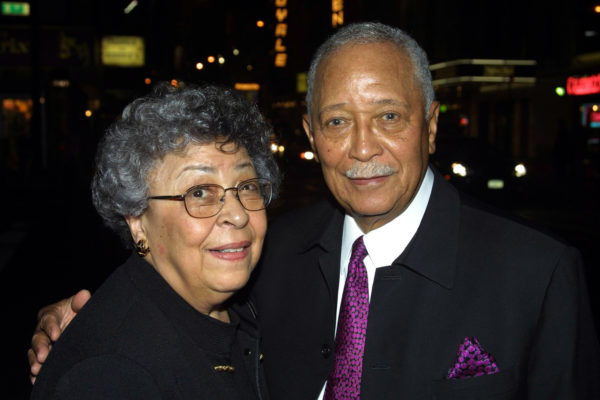David Dinkins, the first and only Black mayor of New York City, died Monday, Nov. 23, in his home on Manhattan’s Upper East Side. He was 93.
Dinkins was found unresponsive by a health aide Monday night, two senior officials from the New York Police Department told NBC New York. His death comes one month after that of his wife of 70 years, Joyce Dinkins, and is believed to be from natural causes.

A former Marine and attorney who attended Howard University, Dinkins was elected mayor after defeating incumbent NYC Mayor Edward I. Koch in the 1989 primary and Rudy Giuliani in the general election.
The trailblazing history-maker took the oath of office Jan. 1, 1990 ,and pledged to use his position to unite the city he viewed as a “gorgeous mosaic” of diversity.
“I intend to be the mayor of all of the people of New York. This administration will never lead by dividing, by setting some of us against the rest of us, or by favoring one group over others,” Dinkins said during his inaugural speech.
Born July 10, 1927 in Trenton, New Jersey, Dinkins became familiar with racial injustice early in life. He couldn’t use his high school’s whites-only swimming pool and was denied admission on a bus in the segregated South while in his Marine uniform because the section for Black people was full.
The injustices he saw motivated Dinkins to enter politics to make a difference. He was elected to the State Assembly in 1965 and became the president of the Board of Elections in 1972. He was also elected as Manhattan borough president in 1985 before making history with his mayoral win.
Dinkins was also a member of the notable Harlem Gang of Four — a group of Black leaders that included Dinkins, U.S. Rep. Charles Rangel, the state’s first Black secretary of state Basil Paterson and civil rights lawyer Percy Sutton.
During his mayoral term from 1990 to 1993, Dinkins advocated for equality, education and better opportunities for disenfranchised New Yorkers.
It was a sharp contrast to Koch’s leadership during his term, which was marred by racial tension and unrest. (It was during Koch’s tenure that the Central Park Five were wrongfully convicted of a rape they didn’t commit and Black teen Yusef Hawkins was murdered in the predominately Italian Bensonhurst neighborhood of Brooklyn.)
While in City Hall, Dinkins expanded affordable housing, cleaned up Times Square, worked to combat the HIV/AIDS epidemic and increased the amount of police officers in the city.
He also ensured the U.S. Open’s residence in New York for many years by signing an agreement with the United States Tennis Association that gave the organization a 99-year lease on city land in exchange for a tennis complex.
A highlight of Dinkins’ tenure occurred in 1990, when New York City became the first place Nelson Mandela stopped in the U.S. after being released from prison.
Still Dinkins’ mayoral term was marred by high crime and continued racial unrest. Most notable was the 1991 Crown Heights Riots, which erupted after a 7-year-old Black boy was killed by a vehicle in the motorcade of a Jewish leader. In retaliation, Black youth killed an Orthodox Jewish student visiting from Australia and a non-Jewish man, whom some believe they presumed to be Jewish.
This incident, coupled with a Black-Korean conflict and the perception Dinkins was being too soft on certain issues, contributed to him being a one-term mayor. He was defeated by Giuliani, who opposed him again in 1994.
Dinkins believes racism also played a role in his defeat. He made the admission in his 2013 memoir, “A Mayor’s Life: Governing New York’s Gorgeous Mosaic.”
“When asked why I lost, I used to say, ‘Why do you think?’ I did not want to say it out loud, but it’s time. Now I say, ‘Racism, plain and simple,'” Dinkins wrote.
He also admitted he knew he made mistakes despite his best efforts. “Given the time to reflect and make judgments, I’m sure there were many things I would have done differently,” Dinkins told local media.
After leaving office, Dinkins went on to become a professor at Columbia University’s School of International and Public Affairs and continued working to improve life for his fellow New Yorkers.
He is credited with inspiring other Black leaders with entering politics, many of whom sent touching tributes upon learning of Dinkins’ death.
“The example Mayor David Dinkins set for all of us shines brighter than the most powerful lighthouse imaginable. … Personally, Mayor Dinkins’ example was an inspiration to me from my first run for city council to my campaigns for public advocate and attorney general. I was honored to have him hold the bible at my inaugurations because I, and others, stand on his shoulders,” New York Attorney General Letitia James said in a statement.
Current New York Mayor Bill de Blasio, who once worked as a Dinkins aide, also remembered his mentor and friend.
“Chirlane and I are mourning a truly great man. David Dinkins simply set this city on a better path. He was my mentor, he was my friend, and his steadfast commitment to fight for that “gorgeous mosaic” inspires me every single day. We’ll keep up his fight,” de Blasio tweeted.
Dinkins is survived by his son David Jr., daughter Donna and two grandchildren.